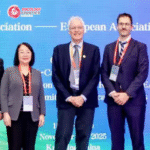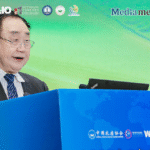
Editor’s Note
On November 8, 2025, the International Academician Forum of the China Conference on Holistic and Integrative Oncology (CCHIO) was held in Kunming with exceptional grandeur. The forum brought together 15 academicians from China, Sweden, Canada, Brazil, South Korea, and other countries to engage in deep discussions on cutting-edge concepts, innovative technologies, and strategic perspectives in cancer control.
Structured into three thematic sessions, the forum covered a wide spectrum of topics, including basic oncology research, artificial intelligence, clinical diagnostics and therapeutics, cancer prevention and control, public health, and emerging technologies. The exchanges highlighted the depth, breadth, and promising future of integrative oncology as a transformative approach in the global fight against cancer.

Forum Venue – Academician Session
Session I
New Technologies, New Concepts, and New Foundations in Cancer Prevention and Control

Academician Hao Xishan & Academician Zhang Yaping
This session was co-chaired by Academician Hao Xishan, Honorary President of the China Anti-Cancer Association and Academician of the Chinese Academy of Engineering, and Academician Zhang Yaping, Academician of the Chinese Academy of Sciences and former Vice President of the Chinese Academy of Sciences.
Three academicians delivered keynote presentations, offering guidance on the development of new technologies, new concepts, and new foundational directions in cancer prevention and control.

Academician Shen Hongbing
Academician Shen Hongbing, Academician of the Chinese Academy of Engineering and Vice President of the China Anti-Cancer Association, delivered a systematic overview of the opportunities and challenges associated with applying artificial intelligence in epidemiology.
He highlighted that AI foundation models have greatly advanced capabilities in handling complex datasets, integrating multimodal information, and predicting health risks. Shen presented real-world applications of AI in infectious disease early warning and chronic disease management, and specifically showcased cutting-edge achievements from Tsinghua University—such as using large language models to predict physiological age and to enable high-precision assessment of disease risk.
Shen underscored the need to address data quality, model interpretability, and ethical considerations when applying AI foundation models to epidemiological research. He called for the development of guidelines and regulatory frameworks to standardize practice and accelerate the translation of AI-driven discoveries into public health applications.

Academician Fan Daiming
Academician Fan Daiming, Academician of the Chinese Academy of Engineering and President of the China Anti-Cancer Association, delivered an accessible yet thought-provoking presentation on his “Three-Character Formula for Cancer Control.” He introduced an innovative, three-pronged strategy for cancer management summarized as “Anti-Cancer, Tumor Control, and Life Support.”
Academician Fan sharply highlighted the current dilemma that the five-year survival rate for patients with intermediate to advanced cancers remains below 20%. He emphasized that cancer management strategies must be tailored to the biological behavior of different tumors:
- Highly aggressive tumors require active and intensive anti-cancer intervention;
- Indolent tumors should be managed with long-term control strategies;
- More importantly, eliminating carcinogenic factors at the root is essential for true cancer prevention.
He stressed: “The left hand fights cancer, the right hand controls tumors, and both hands support life—this is what defines a good doctor.”
Fan further advocated evolving from traditional evidence-based medicine toward “Inquiry-Based Medicine”, summarized as:
“Use evidence but not evidence alone; let experience be a powerful ally; true capability comes from both hands.”
He concluded by underscoring the integrative medicine philosophy of “uniting collective strength, benefiting all patients, and maintaining lifelong commitment.”

Academician Fan Jia
Academician Fan Jia, Academician of the Chinese Academy of Sciences and Vice President of the China Anti-Cancer Association, focused on major clinical challenges in hepatobiliary malignancies and presented a series of innovative advances spanning basic research, translational science, and clinical application. He highlighted his team’s breakthroughs in non-invasive diagnostics, targeted therapy combinations, and novel therapeutic target development, showcasing a successful paradigm for liver cancer research.
His team’s non-invasive diagnostic technologies have now been implemented nationwide, significantly improving the sensitivity of detecting very early-stage hepatocellular carcinoma. By establishing a molecular subtyping system for liver cancer, the team has been able to guide more precise combinations of immunotherapy and anti-angiogenic therapy, contributing to improved survival in patients with intermediate and advanced disease. Furthermore, the development of entirely new therapeutic targets has already achieved preliminary clinical translation, marking an important step toward new breakthroughs in liver cancer treatment.
Session II
Cancer Prevention and Control from a Global Perspective

Academician Xu Binghe & Academician Cheng Xiangdong
Co-chaired by Academician Xu Binghe, Academician of the Chinese Academy of Engineering and senior expert at the National Cancer Center/Cancer Hospital (CAMS), and Academician Cheng Xiangdong, Fellow of the American College of Surgeons and Vice President of the China Anti-Cancer Association, this session featured three academicians from Brazil, South Korea, and Canada.
The speakers shared insights into the current status and recent progress of cancer prevention and control from a global perspective, highlighting diverse international strategies, advances in clinical research, and shared challenges in worldwide oncology practice.

Academician Maurício Magalhães Costa
Academician Maurício Magalhães Costa of the Brazilian Academy of Medicine and the Americas Breast Cancer Integrated Treatment Center provided a global analysis of how environmental and endocrine factors influence breast cancer risk.
He emphasized that breast cancer remains the most common malignancy among women worldwide, with marked disparities in incidence and mortality across different regions and socioeconomic groups. Environmental endocrine disruptors, pollution, lifestyle changes, occupational exposures associated with specific industries, and even global climate change all constitute major risk factors linked to breast cancer development.
With ongoing shifts in lifestyle patterns and the accumulation of environmental contaminants, the global burden of breast cancer continues to intensify—particularly in low- and middle-income countries where mortality rates remain disproportionately high.
Academician Costa called for strengthened international regulatory collaboration, enhanced public awareness and protective measures, and the integration of environmental health considerations into comprehensive cancer prevention and control strategies.

Academician Han-kwang Yang
Academician Han-kwang Yang of the Korea Advanced Institute of Science and Technology (KAIST) and the National Cancer Center of South Korea shared Korea’s successful experience in cancer prevention and control. At the core of Korea’s achievement is a government-led, evidence-based, nationwide cancer screening and prevention system.
Through robust primary prevention initiatives—including aggressive tobacco control, universal newborn hepatitis B vaccination, and eradication of Helicobacter pylori—combined with nationwide screening programs targeting high-incidence cancers such as gastric cancer, colorectal cancer, and breast cancer, Korea has dramatically improved early detection rates. As a result, Korea maintains one of the lowest mortality-to-incidence ratios worldwide for gastric and colorectal cancer, with patient survival outcomes ranking among the best globally.
Looking ahead, Korea plans to incorporate emerging technologies—such as colonoscopy expansion and multi-cancer early detection blood tests—into its national cancer control system. The country also aims to strengthen international collaboration to jointly address cancer challenges across Asia.

Academician Yuzhuo Wang
Academician Yuzhuo Wang of the Canadian Academy of Health Sciences and the University of British Columbia proposed a new framework for reclassifying cancer hallmarks based on tumor cell survivability, invasiveness, and microenvironmental characteristics.
A central highlight of his lecture was the “Lactate Hypothesis.” Wang emphasized that the large quantities of lactate produced through cancer cell metabolism serve as a key molecular link between two major phenomena of the tumor microenvironment: immune suppression and acidity. Lactate, he explained, simultaneously influences cancer cell survival, invasiveness, and multiple malignant behaviors.
Building on this concept, Wang’s team successfully developed a small-molecule inhibitor targeting the lactate transporter MCT4. Preclinical studies demonstrate that the inhibitor suppresses tumor growth both as a monotherapy and in combination with immune cell therapies. This work exemplifies a complete scientific pathway—from theoretical innovation to drug development.
Session III
Innovative Strategies for Cancer Therapy Driven by Frontier Technologies

Academician Zhan Qimin & Academician Shi Hanping
Under the guidance of Academician Zhan Qimin, Academician of the Chinese Academy of Engineering and Supervisor-in-Chief of the China Anti-Cancer Association, together with Academician Shi Hanping, Fellow of the American College of Surgeons and Vice President of the China Anti-Cancer Association, three academicians presented cutting-edge insights into emerging strategies for cancer treatment.
Their talks covered advances in ocular malignancies, radiotherapy, and anti-angiogenic therapies, outlining new technological directions and innovative therapeutic concepts that are shaping the future of oncologic care.

Academician Fan Xianqun
Academician Fan Xianqun, Academician of the Chinese Academy of Engineering and Vice President of the China Anti-Cancer Association, focused on innovative diagnostic and therapeutic approaches for ocular malignancies, including retinoblastoma, uveal melanoma, meibomian gland carcinoma, and eyelid tumors. He provided an overview of recent advances in the management of malignant eye tumors.
Academician Fan emphasized that ocular tumors are rare, insidious in onset, and often lead to blindness or even death, posing substantial clinical challenges. In addressing these challenges, he highlighted key innovations in both mechanistic research and therapeutic technologies.
From a mechanistic perspective, epigenetics plays a critical role in the initiation, progression, and drug resistance of ocular tumors. On the technological front, minimally invasive, eye-preserving techniques—such as intra-arterial chemotherapy, plaque brachytherapy, and precision surgical interventions—have significantly improved patient outcomes. Fan noted that deeper multidisciplinary integration will continue to drive the development of novel therapeutic modalities for ocular malignancies.

Academician Zhao Hongwei
Academician Zhao Hongwei of the Chinese Academy of Sciences and the Institute of Modern Physics presented the latest advances in particle-beam radiotherapy and targeted alpha radionuclide therapy.
For solid tumors, external particle-beam irradiation leverages the unique Bragg peak effect, enabling highly precise tumor destruction while sparing surrounding healthy tissue. China’s domestically developed heavy-ion therapy systems have now been successfully deployed in multiple regions, demonstrating excellent therapeutic outcomes.
For micro-metastatic lesions throughout the body, internal radionuclide therapy shows tremendous promise. Alpha-emitting radiopharmaceuticals deliver potent cytotoxicity with relatively low toxicity. However, significant challenges remain, particularly in drug development and the large-scale production of medical isotopes.
Looking ahead, the field of radiotherapy is moving toward smaller, lower-cost devices, greater treatment efficiency, and deep integration with artificial intelligence. These advancements aim to make cutting-edge radiotherapeutic technologies accessible to a much broader cancer patient population.

Academician Cao Yihai
Academician Cao Yihai, Foreign Academician of the Chinese Academy of Engineering, Academician of the European Academy of Sciences, and professor at the Karolinska Institute, presented an in-depth analysis of resistance mechanisms and innovative strategies in anti-angiogenic therapy.
Academician Cao highlighted that KRAS-mutant tumors often exhibit abnormal vascular architecture, altered adipose microenvironments, and hypoxia-driven feedback loops—all of which can contribute to therapeutic resistance. Based on these findings, he proposed that overcoming resistance should not be confined solely to tumor-intrinsic targets. Instead, a systemic therapeutic framework is needed.
He introduced groundbreaking work showing that cold exposure or pharmacologic activation of brown adipose tissue can significantly suppress tumor growth and prolong survival. This metabolic intervention strategy offers a novel conceptual pathway for cancer therapy, deepening our understanding of resistance biology and opening new avenues for anti-tumor treatment.
Conclusion
This year’s forum showcased the deep insights and forward-looking perspectives of academicians from China and abroad in the field of cancer prevention and treatment. Through cross-disciplinary and cross-national dialogue, the forum infused new momentum into the development of integrative oncology.
Many academicians emphasized that the future of cancer control must place greater importance on prevention, early detection, and holistic regulation. With continued technological innovation and global cooperation, the ultimate vision of cancer control— “Uniting collective strength, benefiting all patients, and maintaining lifelong commitment”—will move increasingly within reach.


